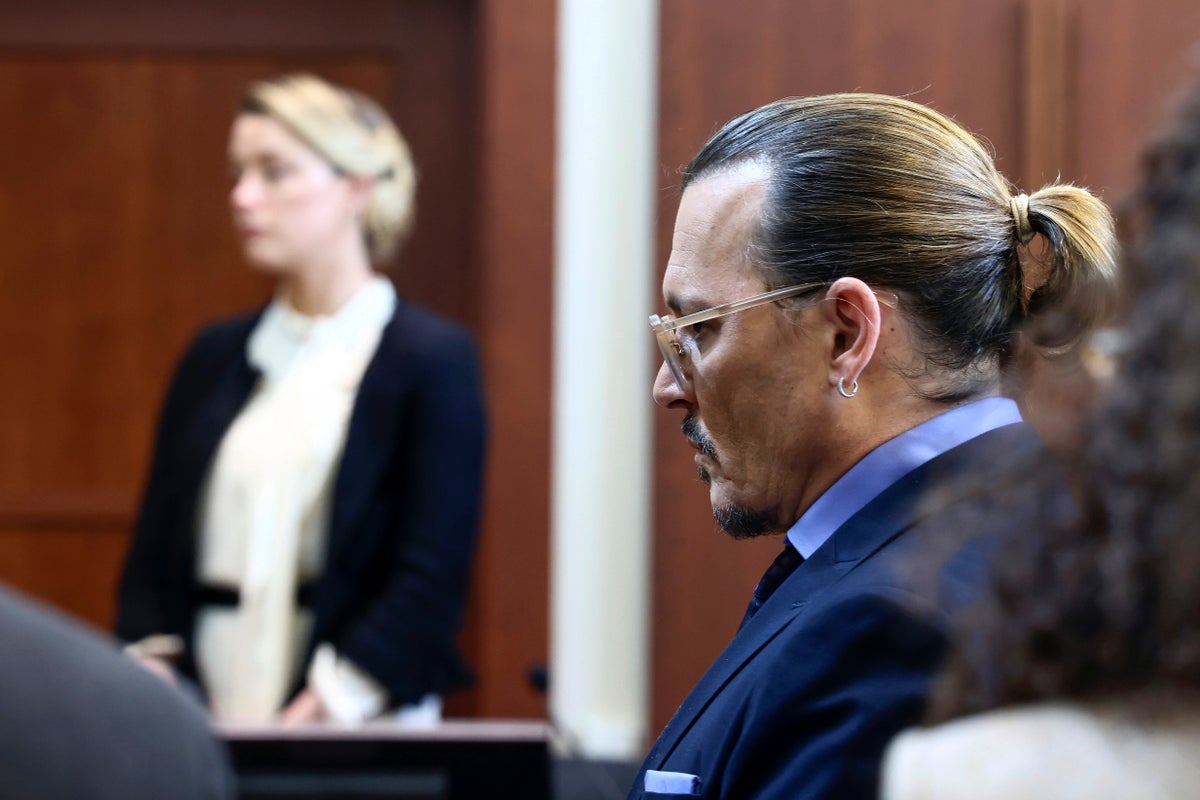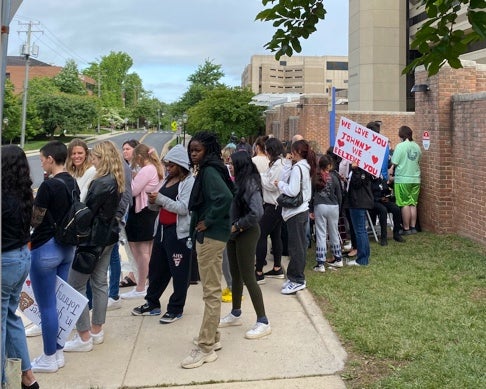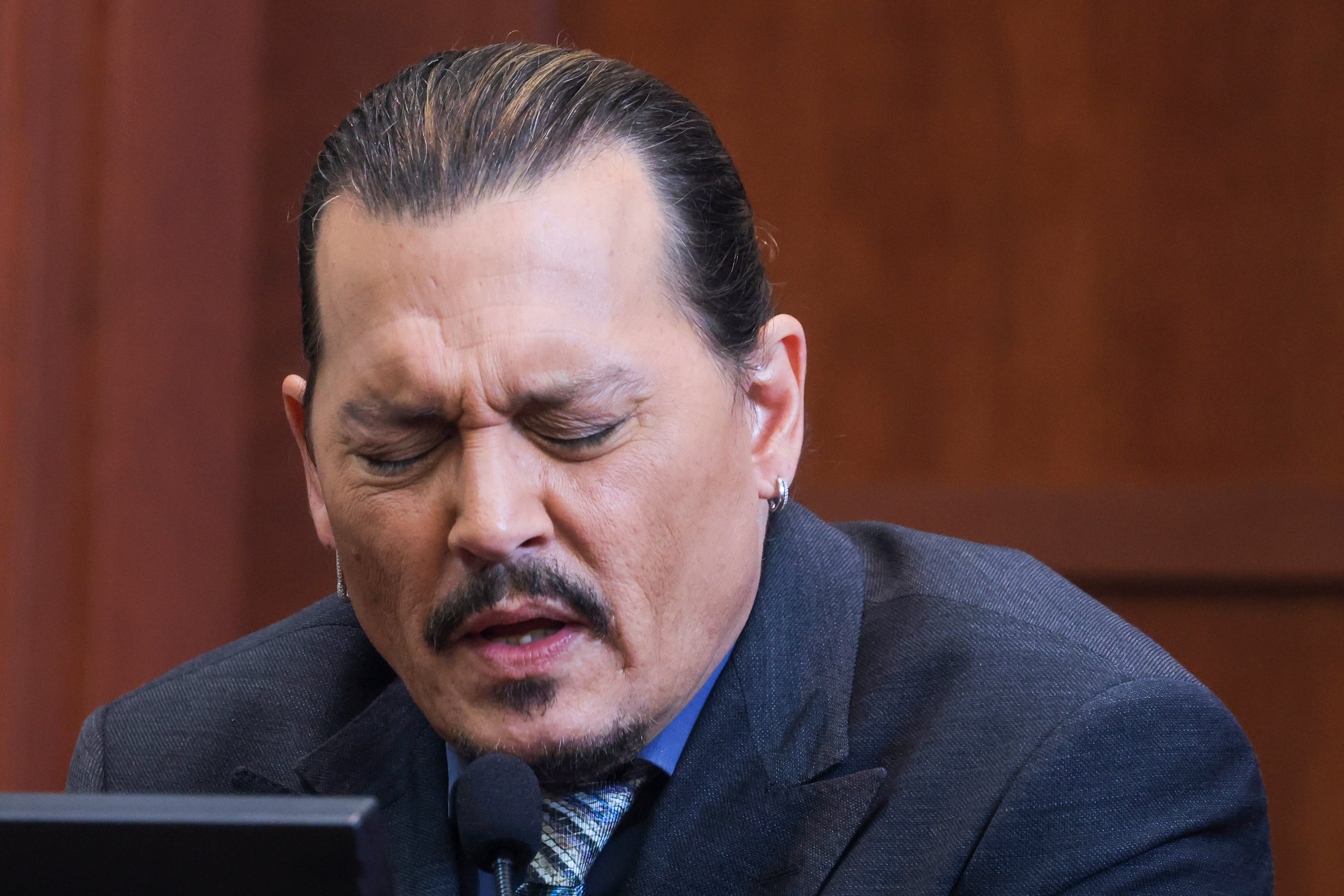
Of all the accusations to emerge from the bombshell defamation trial opposing Johnny Depp and Amber Heard over the course of six weeks, one of the most memorable came from social media.
On 5 May, the internet blew up with online sleuths claiming they had caught Amber Heard snorting cocaine on the witness stand at the court in Fairfax, Virginia.
Short video snippets began circulating of the Aquaman actress blowing her nose with a tissue during a pause in her courtroom testimony.
“Amber Heard snorting coke on the stand is the craziest thing I have ever seen,” one person captioned one particular YouTube video which had garnered more than 23,000 views.
Millions watched and shared the clips across various social media channels, with one single TikTok video purporting to show her “taking a bump” topping more than 38 million views and six million likes by 25 May.
What appears to have been lost from the attention of those jumping on the accusation – aside from the fact that everyone entering the courthouse is screened for contraband and not to mention the sheer unlikelihood that a defendant in a $50m case where substance abuse is centrestage would take drugs while their testimony was being watched live by millions worldwide – was the reason she was wiping her face with tissues.
During that day’s testimony, Ms Heard had described in graphic detail a brutal alleged instance of sexual assault and one of her most damning accusations against her former husband Johnny Depp.
Breaking down in tears, she testified that Mr Depp raped her with a liquor bottle during a violent incident in Australia in 2015.
She told the court how she was pinned down over a bar as a glass bottle was shoved inside of her body.
She sobbed as she described how she felt “this pressure on my pubic bone” and initially thought she was being punched.
And she spoke of the terror as she lay there praying that the glass inside of her wasn’t broken.
But this testimony was absent from the short video clips circulating online under hashtags such as #amberheardisaliar and #justiceforjohnnydepp.
In a case where both former spouses have leveled serious allegations of domestic violence against one other and where tens of millions of dollars are at stake, social media has increasingly hijacked proceedings.
The online obsession spurs a troubling question: Does the verdict really matter?

“Social media has weaponised this trial,” Evan Nierman, CEO of Red Banyan Crisis PR firm and author of book Crisis Averted, tells The Independent.
“More people are drawing conclusions about guilt or innocence based on online curated content than they are the facts in the courtroom.
“And that could have serious consequences for all of us moving forward.”
Bizarre fandom and viral videos
Internet frenzy over the case has ranged from everything from bizarre conspiracies to fandom to memes and outright falsehoods.
When Ms Heard first took to the stand, a conspiracy theory went viral claiming that the opening lines of her testimony had been stolen from the 1999 film The Talented Mr Ripley – with Ms Heard simply switching the lead character’s name for “Johnny”.
The claim was easily debunked but not before it had already gained traction across Twitter and Facebook.
This came after another bizarre claim at the start of the trial that Ms Heard was intentionally copying Mr Depp’s wardrobe choices, with social media users pointing to the likes of a bee pin in her shirt to her wearing her hair swept up in a ponytail.
Her appearance became a source of online mockery again last week when thousands posted or shared side by side photos comparing her outfit to that of Austin Powers’ villain Dr Evil.
Other clips of courtroom testimony have also transformed into TikTok trends.
TikTok users became obsessed with one particular snippet of Ms Heard’s 4 May testimony where she told the court “my dog stepped on a bee” and then winced.
That single phrase – which was part of her account of a day she and Mr Depp allegedly got into a violent fight – kicked off a viral trend of people stitching her testimony with videos of themselves providing rhyming phrases and imitating her wince.
“My dad has to pee” and “my mom stuck in a tree” were just some of the rhymes conjured.
There’s also viral videos of Mr Depp – though rather than mockery, many involve fawning over his actions in and out of court such as one clip of him pulling a chair out for his attorney and another where he entertains fans outside by doing his Captain Jack Sparrow voice.
One video of the latter has topped one million views on Twitter.

Meanwhile, a bizarre online fandom has also emerged for the popular stars of the show, namely Mr Depp’s firebrand attorney Camille Vasquez.
Fan pages have sprung up on social media for the lawyer and online search for the attorney skyrocketed 4,350 percent in the last month, according to Google Trends.
Ms Vasquez doesn’t appear to be shying away from the attention either as, after Mr Depp’s fans championed her online, videos then surfaced of her greeting Alpacas which some fans had brought to the courthouse.
Social media jury
Overall, the online obsession with the trial has soared, with experts comparing it to the OJ Simpson trial of the social media age.
Globally, search interest peaked on 17 May when Mr Depp’s attorneys concluded their cross-examination of Ms Heard, according to Google Trends.
It’s an obsession that is glaringly skewed in Mr Depp’s favour.
While many of the top searched questions for both parties relate to who is winning the trial, when it will be over and their ages or wealths, there are some differences.
“Is Amber Heard lying?” ranked fifth in the top questions about Ms Heard in the last 12 months.
By contrast, the fifth ranked question for Mr Depp in the same period was: “How tall is Johnny Depp?”
Popular hashtags of the two stars also tell a similar story of how social media users are predominantly Team Depp.
On TikTok, the hashtag #johnnydeppisinnocent had 4.9 billion uses by 25 May, while #justiceforjohnnydepp had 15.7 billion uses.
Similar hashtags in support of Ms Heard had only a fraction of the use, with justiceforamberheard racking up 52.1 million uses while #amberheardisinnocent had just 4.1 million.
#Amberturd meanwhile had three billion uses.
It seems the social media jurors have already reached their verdict in the case.
And many are drawing in followers in the process.
TikTok user cbatogivename tells The Independent that she doesn’t see herself as a Mr Depp fan but is definitely on his side in the defamation trial.
“If he was in London I wouldn’t go to try to see him but I do support him as the person that he is,” she says.
“He seems like a gentle soul.”
The woman from Surrey, England, who preferred not to have her real name published, is one of many TikTok users who have amassed a huge following since they started posting pro-Depp coverage of the trial on the platform.
She had been watching the trial all day every day from the very start and kept noticing some “comical moments” in the courtroom.
“Obviously it’s a very serious subject but actually I found myself bursting out laughing sometimes at the things going on in court,” she says.
Then, on 27 April, she posted one such moment on TikTok.
It was a video showing Mr Depp helping to free a laptop cable for Ms Vasquez, captioned: “The little things”.
The video quickly reached 5.5 million views. As of 25 May, it had 12.9 million views and one million likes.
“I wasn’t expecting it to blow up,” she says.
“Everyone was commenting on it saying give us more and more.”
And so she did.
Since then, her account has been dedicated to the trial and her followers have skyrocketed from 206 to 173,000 in the space of just three weeks.
To date, her most popular video has more than 29 million views.
Before the trial, she says her top TikTok videos got around 8,000 views.
She puts the online fascination with the trial down to the former couple’s A-list status and the fact the case gives an “in-depth look at someone’s life that you’ve never been able to look at before”.
For cbatogivename, her mind was already made up about whose side she was on long before the trial started back in early April.
And it was social media which led her to side with Mr Depp.
Mr Depp brought a UK libel case against The Sun newspaper over an article calling him a “wife beater”. He lost the case in 2020.
“He did lose which was unfortunate but since then lots of things popped up social media wise,” says cbatogivename.
“People found the ins and outs and videos and you kind of saw a different person than the one the media portrayed him to be.”

As far as cbatogivename is concerned, TikTok is essentially “a whole network of investigators and lawyers” who have dug into the case and found details that discredit Ms Heard’s claims.
While she reveals she has faced some backlash over her TikToks from fans of Ms Heard, she says it’s been rare.
But the same cannot be said for social media users taking the other side in the case, she says.
“Nine out of 10 times, if someone puts up something pro-Amber there will be a backlash from people who disagree,” she says.
Winning in the court of public opinion
Jurors in the multi-million-dollar trial could begin deliberations as soon as Friday after Ms Heard’s and Mr Depp’s teams deliver their closing arguments to the court.
But, based on the online circus surrounding the case, has Mr Depp already won the real battle in the court of public opinion?
“Amber Heard’s reputation has ironically been defamed during what is a defamation trial,” sociologist and sexual violence researcher Nicole Bedera tells The Independent.
“Regardless of the outcome of the trial, it will be very difficult for Amber Heard to be the winner here.
“She has faced so much online harassment and threats of violence… there isn’t necessarily any fixing of the trauma from that.
“So even if she wins I think it will still feel like a failure for her.”
If “humiliating” Ms Heard and gaining empathy and supporters was Mr Depp’s motivation for bringing the case, then Ms Bedera says he has already “won”.
During the trial, the court was shown a text message where Mr Depp said that his ex-wife was “begging for total global humiliation.... she’s gonna get it”.
“Sometimes when perpetrators bring defamation cases it is just to harass the victim and sometimes the goal is to stay in contact with them,” says Ms Bedera.
She adds: “It is about revenge and humiliating the victim.”
Mr Depp strongly denies all allegations of physical and sexual violence made by Ms Heard and claims she was the abuser in the relationship.
Regardless of innocence or guilt, Ms Bedera says the outpouring of support for Mr Depp is not actually surprising.
Himpathy
Given the extent of his star status and how long he has been in the public eye, people are more likely to empathise with him, she says.
It was back in 1984 when Mr Depp first hit screens in A Nightmare on Elm Street.
Three years later, he then shot to fame on the series 21 Jump Street and, over the next almost four decades, he has become one of the biggest stars in the world.
Ms Heard meanwhile is far less well known, rising to fame only around a decade ago in the 2011 movie The Rum Diary where she starred opposite her future husband Mr Depp.
The sad reality is that people would rather believe that Ms Heard is lying about the abuse than believe that the movie star they grew up watching and looked up to could have done the things he is accused of, says Ms Bedera.

“For people who grew up watching him and who saw him as a role model in their childhood to see him as a perpetrator of gender-based violence is hard to stomach and it makes people feel unsafe,” she says.
“It also makes people feel guilty if they continue to like him,” she says.
“Everyone thinks gender-based violence is wrong up until they like the perpetrator.”
As the trial progressed, she says it became something of a “moralistic problem” where people struggled to renege their support and admit they could have been wrong – regardless of any of the evidence.
“As people got more invested in the case and publicly announced they were on his side it became harder and harder to admit they were wrong,” she says.
“People are more prepared to protect their own self image than to protect the truth.”
From a sociological standpoint, it is also common for the public to have more empathy for an alleged perpetrator of sexual violence than for the victim.
Dubbed “Himpathy”, Ms Bedera says people are “programmed” to show more concern for the impact on a perpetrator’s future than on the future of the victim.
It’s a concept that is most clear in one particularly shocking case.
When Brock Turner raped Chanel Miller on the Stanford University campus in 2015 he was facing up to 14 years in prison.
He was sentenced to just six months and he walked out in three after the judge sympathised with the rapist because – prior to the attack – he was regarded as a model student with a possible future as an Olympic swimmer.
“The centre of cases is often not do we believe victims but is it right to hold the man accountable?” says Ms Bedera.
“It’s a very one-sided level of empathy which sees a lot of men who engage in negative behaviour benefit from it because people reason that they have been ostracised and deserve a second chance.”

As a result, not only has Mr Depp been “exonerated” he has actually “benefitted” from the online obsession over the case, she says.
The explosion of the case on TikTok has given Mr Depp access to a younger fan base, with the biggest proportion of users on the platform aged between 18 and 24 years old – and age group where the 58-year-old actor would not typically be their go-to star.
“He’s definitely become more famous and an entirely new generation of young people know who he is and care about his life,” agrees Mr Nierman.
Misinformation industry
However, the popularity of hashtags and social media content doesn’t necessarily translate into genuine support for Mr Depp and the restoration of his reputation, according to Yotam Ophir, professor at University of Buffalo and expert in communication and online misinformation.
He tells The Independent that there are likely several different motives among the pro-Depp social media movement.
There are those who are genuine supporters of Mr Depp in the defamation trial.
There are those who are using the case’s popularity to bolster their own profiles on social media.
And there’s the “misinformation entrepreneurs” who are hijacking its popularity for other motives.
“It’s really hard to know the source of each argument in real time,” he says.
“In the public opinion, Johnny Depp is winning based on the hashtags but I would say there is a combination of things going on.
“I think there are a few people who are genuinely interested or in support of him so they are using hashtags because they genuinely care about him
“The second layer is the people who may want to make a career out of clicks.
“And I think the hashtags are also being hijacked by some people who don’t care at all about him but care about taking credibility away from the MeToo movement.”
He says it is difficult to prove but based on his expertise and how the likes of the #justiceforjohnnydepp hashtag is being used, he believes some see it as an opportunity to push back against the progress made in recent years to tackle sexual violence against women.
“People are saying ‘you told us to believe women but then there’s this case where people say a woman may not be telling the truth’,” he says.
“I think we have a lot of misinformation entrepreneurs who have an incentive to amplify the hashtags for this reason.”
He adds: “It’s a misinformation industry almost.
“And my concern is that it’s going to have an impact beyond whether Johnny Depp’s career is ruined or saved.”
The way the trial is being consumed on social media – presented by the likes of internet sleuths and social media journalists – has also made facts more difficult to distinguish, he says.

“What separates these people who call themselves social media journalists from mainstream journalists is that [mainstream journalists] are bound by journalistic norms and practices and ethics and are held accountable for their reporting,” he says.
“Youtubers and TikTokers have a big audience but they are not playing by the journalistic playbook…
“They are not part of a community that cherishes truth but a community that cherishes clicks.”
Does truth matter?
The courtroom in Fairfax represents a smaller scale of the misinformation war waging on in the US.
“The fact that anybody can say anything they want and can spread misinformation on the vaccine or on global warming, it’s the same here with the amount of rumours and misinformation and alleged leaks from the trial,” he says.
“It’s absolutely mad but the social media companies don’t have any real motivation to control the flow of misinformation as it’s bringing in lots of engagement and clicks.
“Secondly, like with political and public health issues, its seems social media algorithms are working hard to amplify the polarisation of this topic meaning that YouTube and TikTok and Twitter and Facebook and Instagram are not going to show you on your newsfeed the best, most accurate analysis of the case but will show you what you are specifically going to engage with.
“The need to keep you on the platform means they need to show you sensational, controversial and emotional content.”
As a result, people who are following the trial on social media are being “flooded with information in an environment that isn’t incentivised by truth and accuracy”.
For trial followers, staying up to date through heavily-edited clips and short snippets posted on TikTok, there are concerns that the truth is being distorted.
Ms Bedera warns that many of the voices on social media speaking about the case have no expertise in the areas they are giving their views.
“They are not experts in gender-based violence,” she says.
“I saw an interview with a social media therapist who said she had no experience with people in abusive relationships.
“People will start by saying ‘I’m not an expert” and then they will continue talking anyway.”
They are giving their opinion “in the absence of expertise” she says, something she slams as “irresponsible”.

With clicks valued more than facts and the court of public opinion returning its own verdict long ago, the truth seems to have lost some value in the case.
“The truth is under assault in our society more so than in any time in modern history and perception trumps facts and lies and truth are often indistinguishable,” says Mr Nierman.
“That’s true in politics but it’s also true in terms of celebrity lawsuits.”
No winner, just losers
While Mr Depp may well have won the trial on social media, PR experts say that there can be no real winners in the case.
Over the last six weeks, the world has heard shocking details of the former couple’s toxic life together and the most intimate details of their private lives and characters have been dissected both inside the courtroom and online.
Both of their reputations have been torn apart by allegations of violent fights, physical and sexual abuse, and troubling substance abuse and drug addiciton.
For Ms Heard, her name will now also forever be linked to an infamous incident involving alleged human faeces on a bed.
Mr Nierman says Mr Depp and Ms Heard have both lost regardless of what the jurors decide.
“Regardless of the verdict they’ve both lost and lost in a big way,” he says.
“If the jury sides with Johnny Depp, I think he’ll feel a sense of vindication but you still have to ask the question: was it worth it? And in the end I’m not sure you can answer yes to that.”
Juda Engelmayer, the president of PR firm HeraldPR who heads up the crisis PR for Harvey Weinstein, agrees that a “public” win is different to the “private” loss that he thinks they are both walking away with.
“I don’t think anyone wins this. It’s an embarrassment, it’s put their personal baggage out in public and the public has seen dark sides to them that they didn’t want the rest of the world to see,” he tells The Independent.
“When the public aura is of an actor who is funny and a good communicator. People now know that is just an act over a dark veneer.”
In some ways, the outcome may actually be more damaging for Mr Depp because – as a bigger star – he had further to fall.
“Amber Heard was never a leading lady to begin with but Johnny Depp was a leading man beforehand,” says Mr Engelmayer.
“He has had a longstanding career since the 1980s and while he has had bouts with drugs and alcohol, we’ve never heard mean, terrible stories before now.
“We heard disappointing stories but we still managed to love him throughout the past 40 years… they both came into this on different levels.”
Box office future
Despite the damage, Mr Engelmayer believes that they can both use the online obsession with the courtroom saga to make “a comeback” and land roles in Hollywood.
For Mr Depp, the social media circus and bevy of fans rallying round him (both online and outside the courthouse each day) proves he still has an audience, he says.
“In a sense he can use this social media mass to his benefit commercially and to show Hollywood that when you hire him you still get a fan base,” he says.
“Maybe he won’t be the lovable family hero in a Disney movie but he can be the anti-hero or the guy people love to hate.
“They’ll take chances on him,” he adds.
Mr Nierman says he doesn’t think studios would cut ties with Mr Depp anyway because he is a “proverbial moneymaker” in Hollywood.
That said, the social media support means Hollywood will now have even fewer qualms about hiring him, he says.
“It’s not about how it comes out in court, it’s about how the public perceives what happened,” he says.

By reverse, the outpouring of anti-Heard sentiment online means many studios will now think she is “not worth the risk” of hiring.
“There’s plenty of other actors who can be cast instead of her but there’s only one Johnny Depp,” he says.
However, Mr Engelmayer thinks there will definitely be some wanting to work with her because of her position as an alleged survivor of abuse.
“There will be producers who will say she’s a brave person and a hero for the cause who spoke her truth in a hard time and so she can’t be left behind,” he says.
“People want to be seen as progressive and to be on the right side of history.”
The biggest loser
Ultimately, the biggest loser from the case could actually be the MeToo movement after allegations of domestic and sexual violence have been torn apart and a woman who came forward with the accusations attacked online.
Outside the courthouse on Thursday, Ms Heard was booed and jeered by the crowd as she drove into the grounds.
Her ex-husband Johnny Depp was driven slowly past waving and smiling at fans who waved banners and sported props of his most-loved characters.
“It could be a big loss for the movement and for survivors more broadly,” warns Ms Bedera.
“After the MeToo movement lots of people started to talk and share their experiences and look for support.
“It’s harrowing to think about going back to a time where survivors don’t think they can come forward and say what happened to them.”
While for victims of domestic violence, the fallout from the case could be lasting, social media users will move onto the next viral trend.
cbatogivename says her surge in followers have largely come from the US, now making up 70 percent of all followers.
“I’m thinking about how to stay relevant to them” once the trial ends, she says, adding that Roe v Wade is one topic she is considering.
The only winner here is social media, says Mr Ophir.
“Both Amber Heard and Johnny Depp lose as both of their images are harmed… The other victim will be the MeToo movement that tried to cast a light on male practices in Hollywoodm,” he says.
“So the only winners are the social media companies that get clicks.”







